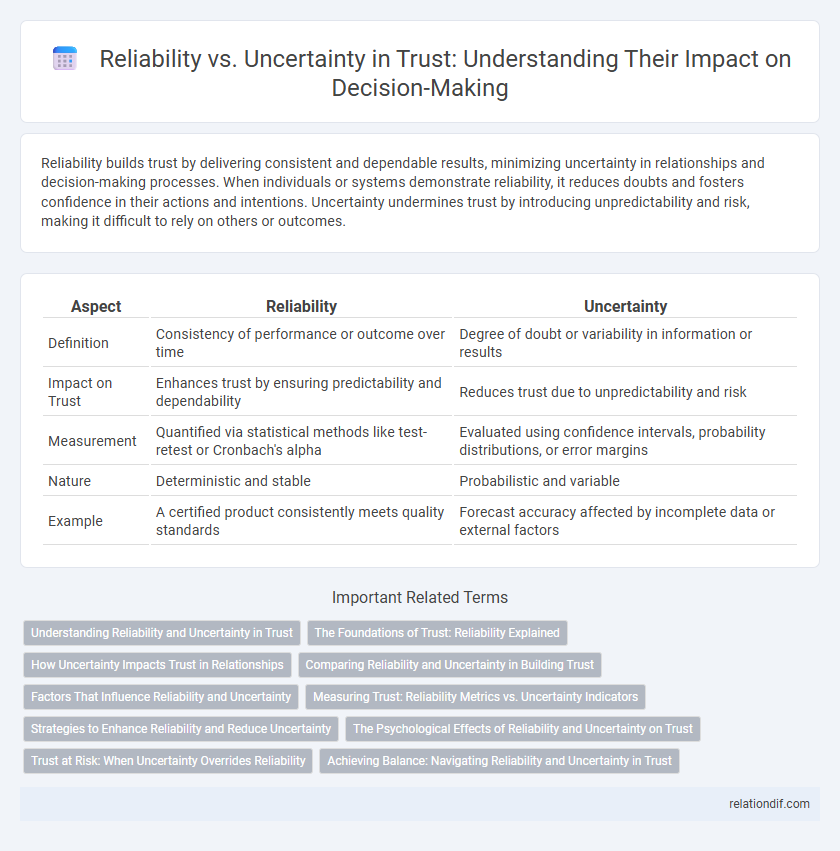Reliability builds trust by delivering consistent and dependable results, minimizing uncertainty in relationships and decision-making processes. When individuals or systems demonstrate reliability, it reduces doubts and fosters confidence in their actions and intentions. Uncertainty undermines trust by introducing unpredictability and risk, making it difficult to rely on others or outcomes.
Table of Comparison
| Aspect | Reliability | Uncertainty |
|---|---|---|
| Definition | Consistency of performance or outcome over time | Degree of doubt or variability in information or results |
| Impact on Trust | Enhances trust by ensuring predictability and dependability | Reduces trust due to unpredictability and risk |
| Measurement | Quantified via statistical methods like test-retest or Cronbach's alpha | Evaluated using confidence intervals, probability distributions, or error margins |
| Nature | Deterministic and stable | Probabilistic and variable |
| Example | A certified product consistently meets quality standards | Forecast accuracy affected by incomplete data or external factors |
Understanding Reliability and Uncertainty in Trust
Understanding reliability involves recognizing consistent, predictable outcomes based on past behavior, which forms the foundation of trust in relationships and systems. Uncertainty arises from insufficient information or unpredictable variables, challenging the ability to confidently assess reliability and maintain trust. Balancing reliability with uncertainty requires continuous evaluation of evidence and adaptive responses to evolving situations to sustain trustworthiness.
The Foundations of Trust: Reliability Explained
Reliability forms the cornerstone of trust by ensuring consistent and predictable behavior in people, systems, or processes, reducing uncertainty in interactions. It is measured by dependability, accuracy, and the ability to meet expectations over time, which strengthens confidence and fosters long-term relationships. Understanding reliability involves assessing past performance and stability, key factors that mitigate uncertainty and enhance the foundation of trust.
How Uncertainty Impacts Trust in Relationships
Uncertainty undermines trust in relationships by creating doubts about consistency and predictability, which are essential for reliability. When individuals face ambiguous actions or unclear intentions, their confidence in others' dependability diminishes, leading to weakened bonds. Establishing transparent communication and consistent behavior mitigates uncertainty and strengthens relational trust.
Comparing Reliability and Uncertainty in Building Trust
Reliability establishes a consistent foundation for trust by delivering predictable and dependable outcomes, while uncertainty undermines confidence through unpredictability and risk. Trust grows stronger when individuals or systems demonstrate reliability, reducing ambiguity and fostering assurance in their actions. In contrast, high uncertainty challenges trust by introducing doubts and potential for unexpected failures.
Factors That Influence Reliability and Uncertainty
Reliability depends on consistent performance, accuracy of data, and robustness of systems, while uncertainty arises from incomplete information, variability, and unpredictability in external conditions. Factors influencing reliability include quality control, redundancy measures, and thorough testing protocols, whereas uncertainty is affected by dynamic environments, lack of transparency, and rapid technological changes. Understanding these elements is crucial for managing risk and building trust in processes and decision-making.
Measuring Trust: Reliability Metrics vs. Uncertainty Indicators
Measuring trust effectively involves balancing reliability metrics, such as uptime percentages and error rates, with uncertainty indicators like confidence intervals and variance analyses. Reliability metrics quantify consistent performance, while uncertainty indicators capture the potential variability and risks inherent in trust assessments. Integrating both approaches provides a comprehensive understanding of trustworthiness in complex systems.
Strategies to Enhance Reliability and Reduce Uncertainty
Implementing redundant systems and rigorous testing protocols significantly enhances reliability by minimizing the risk of failure. Leveraging real-time data analytics enables accurate forecasting and rapid response to emerging uncertainties. Establishing clear communication channels and standardized procedures further ensures consistent performance and trustworthiness in unpredictable environments.
The Psychological Effects of Reliability and Uncertainty on Trust
Reliability fosters trust by reducing anxiety and enhancing a sense of predictability in relationships, leading to increased confidence and cooperation. Uncertainty triggers psychological stress and skepticism, weakening trust through fear of potential negative outcomes. Consistent reliability activates positive neurochemical responses, reinforcing trust bonds, while uncertainty provokes caution and defensive behaviors.
Trust at Risk: When Uncertainty Overrides Reliability
Trust at risk emerges when uncertainty eclipses reliability, undermining confidence in systems, relationships, or information. Consistent performance and transparent communication serve as critical pillars for maintaining trust, while erratic behavior or ambiguous outcomes fuel doubt and hesitation. Organizations and individuals must prioritize mitigating uncertainty to preserve trust and ensure sustained engagement.
Achieving Balance: Navigating Reliability and Uncertainty in Trust
Achieving balance in trust requires understanding the dynamic interplay between reliability and uncertainty, where consistent actions and transparent communication reduce doubts and foster confidence. Organizations and individuals build trust by managing expectations through predictable behaviors while remaining adaptable to unexpected changes without compromising integrity. Embracing uncertainty as an inherent aspect of relationships encourages resilience and continuous reassessment, strengthening trust over time.
Reliability vs uncertainty Infographic

 relationdif.com
relationdif.com